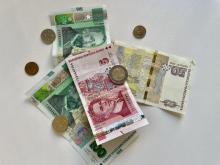Institute for Market Economy
Bulgaria's Housing Market Surges as Banks Inject Billions in Credit
Bulgarian banks have injected approximately 3.7 billion in additional credit resources into the housing market over the past year alone, with a staggering total of over 8 billion in the last three years, according to Lachezar Bogdanov, chief economist at the Institute for Market Economy, speaking on Nova TV.
Bulgaria Approaches 62% of Average European Income
Recent figures from Eurostat, cited by the Institute for Market Economy, highlight Bulgaria's progression to 62% of the average European income and standard of living. This updated data for 2022 reflects a 12% growth over the past five years, signaling a positive trend for the country's economic standing.
- Read more about Bulgaria Approaches 62% of Average European Income
- Log in to post comments
Underreported US and Canadian Investments Surpass Official Figures in Bulgaria
Investments from the USA and Canada in Bulgaria surpass the country's official balance of payments report findings, as per a recent Institute for Market Economy (IME) study spanning five years.
Bulgarian Economists: The Big Increase in Food Prices is Over
In 2022, inflation was in energy raw materials, since the beginning of this year, this has changed and food price increases are now leading. Petar Ganev from the Institute for Market Economy commented on this in the morning block of the National Television.
Georgi Vuldjev, an economic expert at EKIP, was also a guest on the topic.
Bulgaria: Mayors Buy Medicines for Entire Villages as 1/3 of the Pharmacies in the Country are in just 3 Big Cities
Hundreds of residents of small settlements in Bulgaria continue to be without access to medicines.
According to data from the Executive Medicines Agency, by 2021 the number of pharmacies in our country was 3,300, with a third of them concentrated in Sofia, Plovdiv and Varna.
The Average Salary in Bulgaria Now Exceeds BGN 1,000 (EUR 510)
The average salary in the country exceeded BGN 1,000 in all regions. There are still small municipalities, with lower incomes and with a real danger of impoverishment of groups of the population. However, average incomes are still outpacing consumer price growth. The data are from the Institute for Market Economy.
What Results the Census Would Yield in Bulgaria?
The most important result of the national census will be the number of the population, and certainly what we will see is a new correction downward due to the migration processes, Adrian Nikolov from the Institute for Market Economy told BNR.
According to him, the big risk is very low confidence in the census, which will mar the data from the survey.
- Read more about What Results the Census Would Yield in Bulgaria?
- Log in to post comments
Pandemic Blurs Differences between Regions in Bulgaria
The pandemic brings the regions of Bulgaria closer together being part of the crisis in itself. It very disproportionately affected the leading economic centers and in this sense the gap was bridged. Of course, when we return to the moment of recovery, the gap will reopen, because the regions with the greatest growth potential are hit hardest.
Bulgaria's Move to Join the Euro Welcomed
Despite public fears that adopting the single currency will cause prices to rise in Bulgaria, analysts believe the country's plan to apply to the ERM II mechanism - known as the eurozone's "waiting room", will bring benefits to the country.
- Read more about Bulgaria's Move to Join the Euro Welcomed
- Log in to post comments
Bulgaria Overcomes Consequences of Economic Crisis Due To Fast Growth of 9 Regions
Bulgaria has overcome the consequences of the economic crisis but this due to the faster development of only 9 regions, while the rest have remained "submerged".










